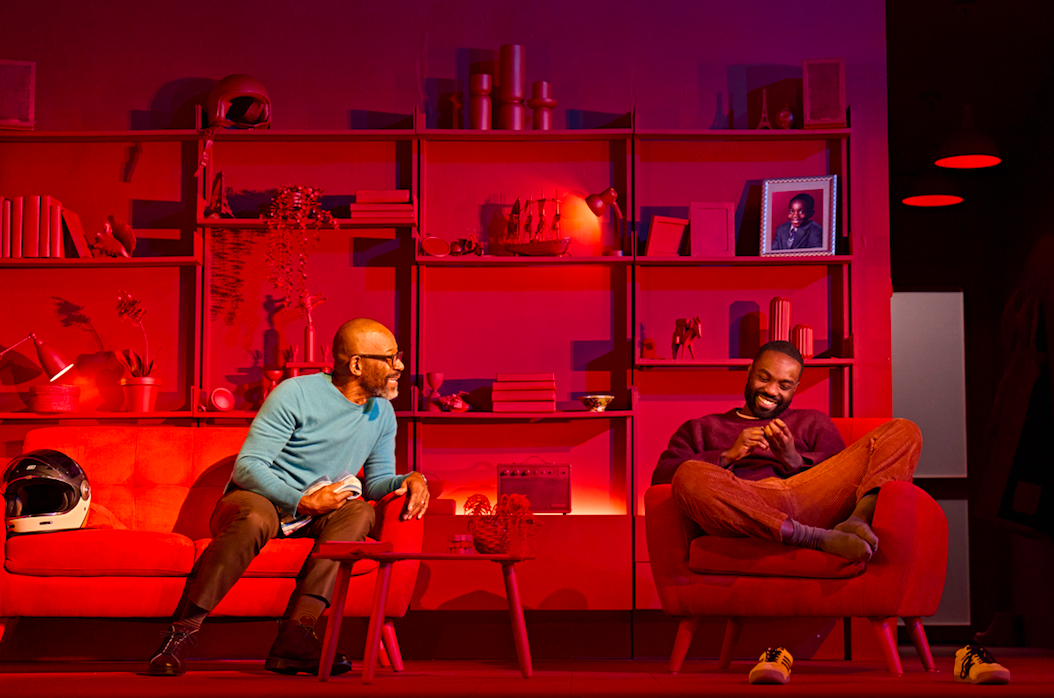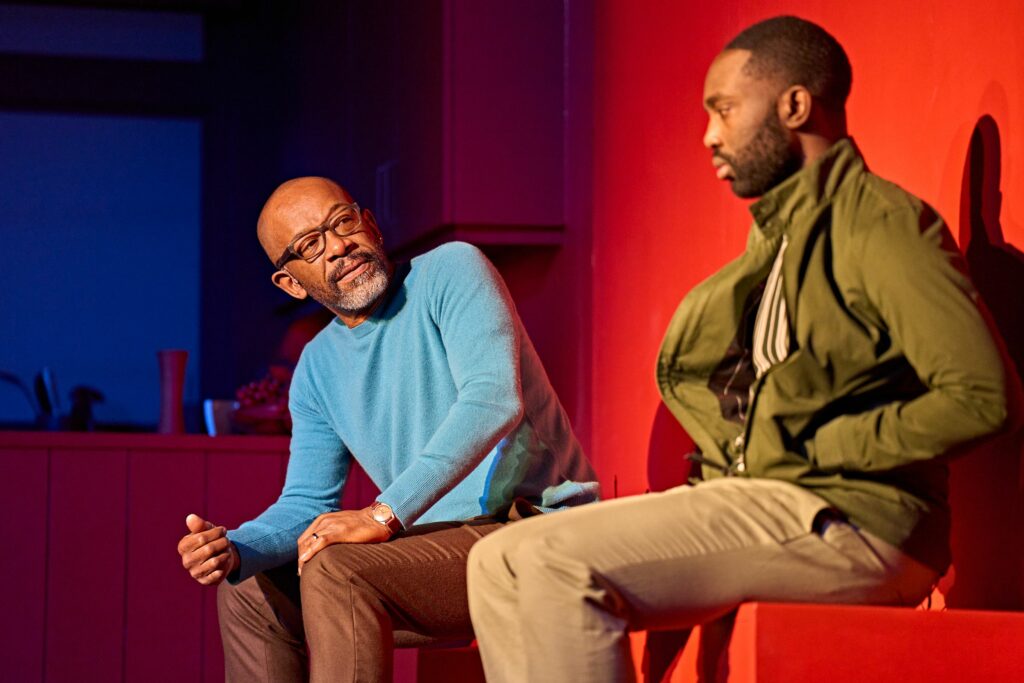Lennie James and Paapa Essiedu on creating the play that gal-dem made happen
Two of our favourite actors hit the stage in a surreal paternal drama they started working on after our Guardian takeover interview... you're welcome!
Niellah Arboine
17 Feb 2022

photography courtesy of Old Vic (Manuel Harlan)
When gal-dem first caught up with Lennie James and Paapa Essiedu back in 2020, the two actors hadn’t met yet. Speaking over Zoom in the midst of the pandemic, they both knew of each other, admired the other’s career and had been told one day they needed to work together in some capacity. Now two years on, sitting side-by-side on a sofa, both wearing caps in a room somewhere in the Old Vic theatre in London, they chat and laugh like old friends.
“That interview was quite significant, specifically to the moment we’re in now,” Paapa, who dazzled in I May Destroy You, says. It’s the opening week of A Number, a father-son(s) play by Caryl Churchill, exploring the complexities of parenthood, identity and second chances – and without giving too much away – set within the frameworks of a cloning scandal.
“Part of that particular [gal-dem] interview was when Lennie was talking to me about an ‘unnamed’ Caryl Churchill play, he had spoken to an ‘unnamed’ director about doing with me,” Paapa says in a wink-wink nod-nod way. “You thought it was a lie!” Lennie butts in laughing. But it was true. Lennie had been approached about A Number twice by two different directors both suggesting Paapa. “I’d never read this play before, so I didn’t know what he was talking about, but this is the play,” Paapa says. “In many ways, we’ve got you to thank for it.”
While neither actor is a stranger to theatre, a lot of thought still goes into selecting an on-stage role. For Lennie, who has graced our screens in shows like The Walking Dead, and more recently in Sky TV’s Save Me, his return to theatre after a long hiatus really needed to be the right fit alongside the right team. “I missed it for well over a decade and I wanted to get back,” he says. “I’d put it out there… that in this time I want to be doing a play. I don’t want to be doing anything else.”

For Paapa, who has appeared in King Lear at the National and The Convert at the Young Vic to name a few, he wants to be challenged by theatre. “I want to do things that I haven’t done already, take risks, and I want to be surprised and surprise people”.
Luckily, the stars aligned and they finally found each other, playing one of the most intimate relationships out there – father and son. “It’s hard, you know? It’s got to be with the right person” Pappa ponders. “When I say ‘right’, I don’t mean in a career move ‘right’. I mean in a way that feels right because when you’re doing a play, you’re with that person…” “a lot!” Lennie interjects and they both laugh. “The vulnerability demanded, especially in a play like this, you can’t do with someone that you don’t deeply want to be around or deeply feel comfortable with.”
Their chemistry off stage feels so natural and clearly, it flows right into their onstage performances. It’s difficult to take your eyes off them, as Paapa jumps from son to son to son (he plays all of them), and Lennie, who plays Salter, shifts in accordance. You can feel the tension, the yearning for a father’s love, in fact, you can practically hear the unsaid words in their stiff, uncomfortable silences.
The pandemic has had a colossal impact on the arts. While the film industry ended up with a backlog of content and was able to hit the ground running, the theatre world – which depends on live audiences – came to a halt. “It’s kind of like feast or fallow I suppose,” Paapa says about the two industries. The break from work did however make him more intentional with how he picks roles. “I think having courage and conviction to only work on things that mean something to you and that you feel can be meaningful to other people, I think for me is becoming a bigger motivating factor.”
“The career they build for themselves is built as much on what you say yes to, as what you say no to. And sometimes saying no could be the most important decision that you make”
It’s something Lennie, who has more years of experience in the industry, continues to preach. “If I’m giving advice to younger actors, I always remind them that the career they build for themselves is built as much on what you say yes to, as what you say no to. And sometimes saying no could be the most important decision that you make.”
This is also the first time A Number has been played by black actors, and while it doesn’t change the content, it still seems important to mention. “Unavoidably, it’s [A Number] everything to do with being black and nothing to do with being black,” Lennie explains. “It is about how we get perceived and about how we perceive ourselves. There’s no reference to that in the play, but to say it’s not there would be a misreading of the adventure.”
Things are most definitely shifting for black art and black creators, and it’s exciting. As Lennie put it, it’s now time to take full control over our own narrative. “I’m looking forward to maybe this [moment] being the opportunity for us to tell our stories in the way that we want to tell them about what we want to tell them about and that excites me.” Praising shows like I May Destroy You, and Atlanta, for breaking the mould and carving out stories on their own terms, Paapa adds that “something that started off as genre-bending has now become genre-defining.”
Through how they approach roles, their beliefs, and obvious respect for each other, it’s easy to see how Paapa and Lennie are the perfect match on stage, and why they’ve now become IRL mates. So what’s next for the two after A Number? “It’s not the end of our working relationship,” Lennie says, “but more importantly, it’s not the end of our friendship.”





